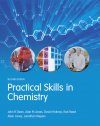Textbook
Out of Print
By: John R Dean(Author), Alan M Jones(Author), David Holmes(Author), Rob Reed(Author), Allan Jones(Author), Jonathan Weyers(Author)
592 pages, Illustrations
![Practical Skills in Chemistry Practical Skills in Chemistry]()
Click to have a closer look
About this book
Contents
Related titles
About this book
If you are studying chemistry, or a related course such as forensic chemistry or biochemistry, then Practical Skills in Chemistry will be an indispensable companion throughout your entire degree programme. This 'one-stop' text will guide you through the wide range of practical, analytical and data handling skills that you will need during your studies. It will also give you a solid grounding in the wider transferable skills such as teamwork and study skills.
Contents
Title page and other publisher info
Contents
List of boxes
Preface
Guided tour
For the Student
Acknowledgements
List of abbreviations
Study and examination skills
The importance of transferable skills
Managing your time
Working with others
Taking notes from lectures and texts
Learning and revising
Curriculum options, assessments and exams
Preparing your curriculum vitae
Information technology and library resources
Finding and citing published information
Evaluating information
Using on-line resources
Internet resources for chemistry
Using spreadsheets
Word processors, databases and other packages
Communicating information
Organizing a poster display
Giving a spoken presentation
General aspects of scientific writing
Writing essays
Reporting practical and project work
Writing literature surveys and reviews
Fundamental laboratory techniques
Your approach to practical work
Health and safety
Working with liquids
Basic laboratory procedures I
Basic laboratory procedures II
Principles of solution chemistry
pH and buffer solutions
The investigative approach
Making and recording measurements
SI units and their use
Scientific method and design of experiments
Project work
Laboratory Techniques
Melting points
Recrystallization
Solvent extraction
Distillation
Reflux
Evaporation
Inert atmosphere techniques
Combinatorial chemistry
Classical Techniques
Qualitative techniques for inorganic analysis
Gravimetry
Procedures in volumetric analysis
Acid-Base titrations
Complexometric titrations
Redox titrations
Precipitation titrations
Analytical quantitative techniques
Fundamental principles of quantitative chemical analysis
Calibration and quantitative analysis
Basic spectroscopy
Atomic spectroscopy
X-ray fluorescence spectroscopy
Chromatography – basic principles
Gas and liquid chromatography*
Electrophoresis
Electroanalytical techniques
Radioactive isotopes and their uses
Analytical structural techniques
Infrared spectroscopy
Nuclear magnetic resonance spectrometry
Mass spectrometry
Thermal analysis
Analysis and presentation of data
Using graphs
Presenting data in tables
Hints for solving numerical problems
Descriptive statistics
Choosing and using statistical tests
Drawing chemical structures
Chemometrics
Computational chemistry
Answers to problems
Index
Customer Reviews
Textbook
Out of Print
By: John R Dean(Author), Alan M Jones(Author), David Holmes(Author), Rob Reed(Author), Allan Jones(Author), Jonathan Weyers(Author)
592 pages, Illustrations
"Any undergraduate who could develop all of the skills in this book would make a fine chemist. [...] it is my view that a book of this type should be primarily for students – after all, skills development should be a personal mission for undergraduate students, and I would recommend any of mine to have a copy of this book on their bookshelf."
– David Smith, Chemistry World



























